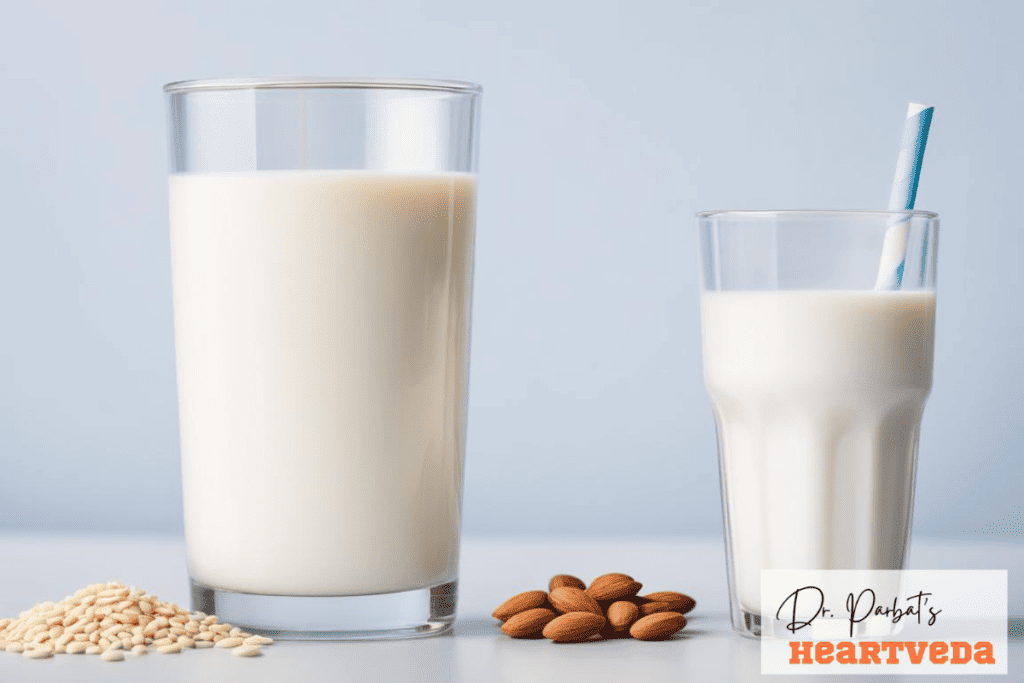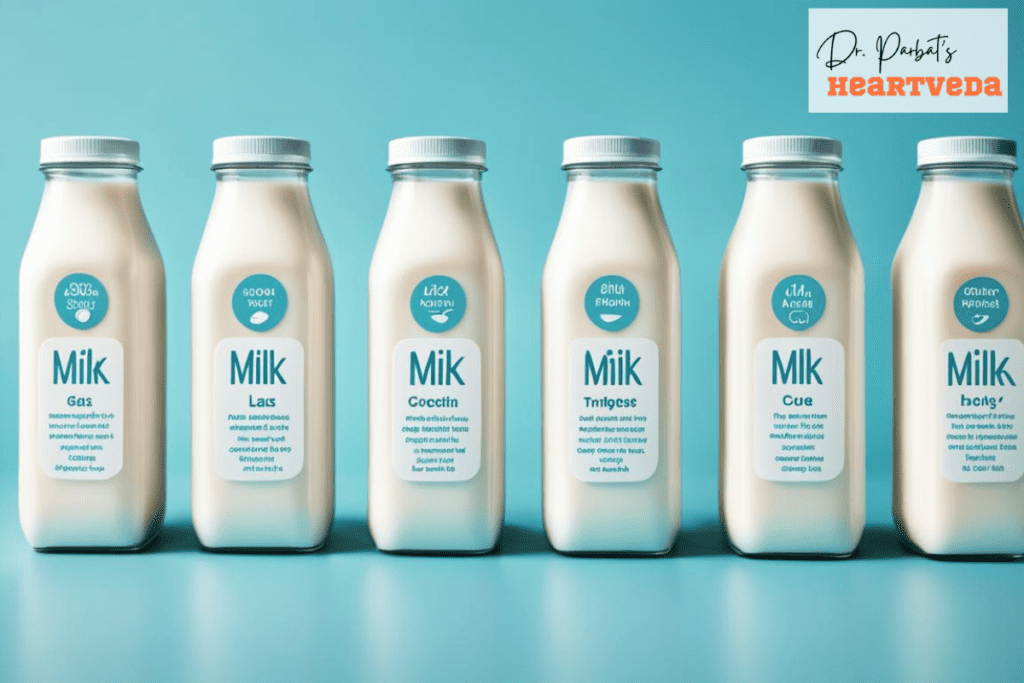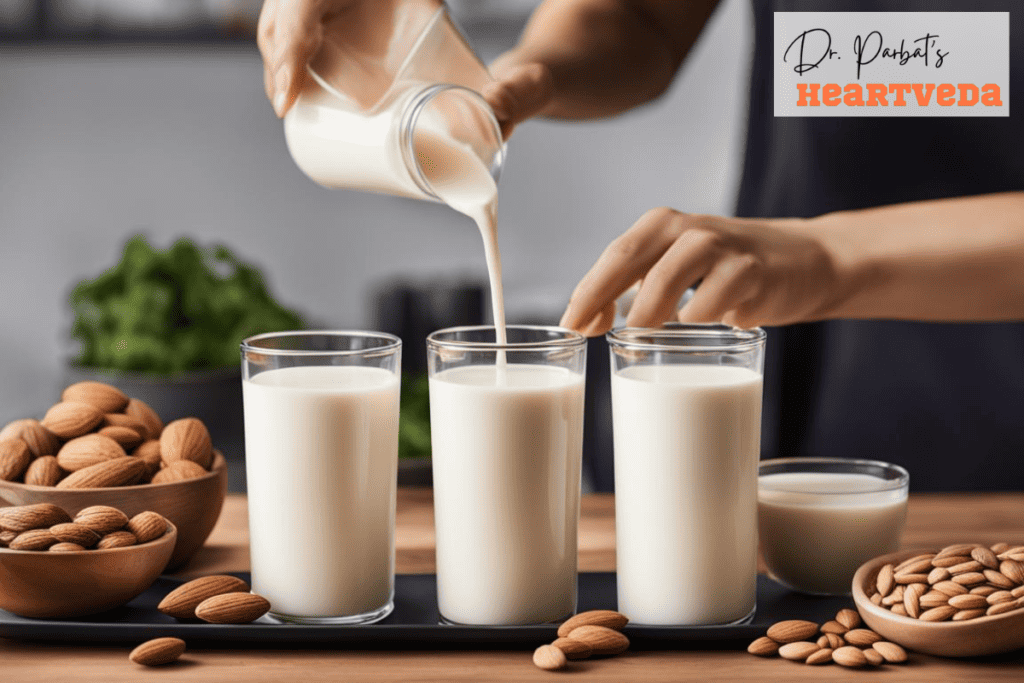
If you’re managing your cholesterol levels, you might wonder about the role of milk and heart health in your diet. It’s true that milk is a nutritious beverage, packed with necessary vitamins and minerals, but its impact on cholesterol levels can’t be ignored. You see, dairy products contain dietary cholesterol, alongside calories and saturated fats, which could potentially affect your heart health negatively if not managed properly. However, these same dairy products can also contribute to protection against ailments like osteoporosis and depression, thanks to their rich content of calcium, vitamin D, and protein.
But did you know it’s your liver that plays a significant part in regulating your cholesterol levels? Yes, your liver adjusts the production of cholesterol depending on your dietary intake, which means that for many individuals, dietary cholesterol from milk might not be as harmful as once thought. Combine this with regular exercise, which is excellent for boosting HDL (the good cholesterol) and reducing LDL (the bad cholesterol), and you’ve got a fighting chance to keep your heart strong. The key is to choose the type of milk you consume carefully, especially if you are a cholesterol patient who needs to drink milk with caution.
Understanding Cholesterol and Milk Consumption
When you’re managing your cholesterol levels, understanding the interaction between diet and your body’s cholesterol production is key. If you’ve wondered, can a cholesterol patient drink milk? It’s essential to consider how dietary choices, such as milk intake for cholesterol patients, can affect your health.
Your liver is the main regulator of cholesterol in your body, adjusting its production based on how much dietary cholesterol you consume. Interestingly, when you eat more foods high in cholesterol, your liver compensates by producing less. Conversely, eating less dietary cholesterol prompts your liver to increase its production.
Beyond genetics, your lifestyle choices, notably physical activity, play a vital role in managing cholesterol levels. Regular exercise not only boosts your HDL (good cholesterol) but also helps in reducing LDL (bad cholesterol). These activities underscore the importance of a holistic approach to managing cholesterol levels beyond just diet.
- Cholesterol is predominantly produced by your liver.
- Dietary cholesterol impacts the amount of cholesterol your liver produces.
- Moderate milk consumption might have a minimal effect on cholesterol levels for most individuals.
For those particularly sensitive to dietary cholesterol due to genetic factors, the impact of milk consumption on cholesterol levels could be more significant. The table below compares various types of milk and their potential influence on cholesterol levels:
| Type of Milk | Total Fat Content | Dietary Cholesterol Content | Saturated Fat Content |
|---|---|---|---|
| Whole Milk | 8 grams per cup | 24 milligrams per cup | 4.5 grams per cup |
| 2% Milk | 5 grams per cup | 20 milligrams per cup | 3 grams per cup |
| Skim Milk | 0 grams per cup | 5 milligrams per cup | 0 grams per cup |
| Soy Milk | 4 grams per cup | 0 milligrams per cup | 0.5 grams per cup |
Understanding these differences helps you make an informed decision about your milk intake, bearing in mind your specific cholesterol management needs. Always remember, balance and moderation are the hallmarks of maintaining healthy cholesterol levels while still enjoying the foods and drinks you love.
The Relationship Between Dairy Products and Heart Health

When you’re navigating the dairy aisle, it’s important to keep in mind how different products can affect your heart health. Dairy essentials like milk are not just rich in nutrients necessary for growth, but their cholesterol content also plays a pivotal role in managing heart health. For instance, while some dairy products might be higher in fats, others have been specially formulated to be friendlier to your cardiovascular system. This is particularly crucial for those among you who are keen on managing calories and cholesterol for weight loss or a heart-healthy diet.
Whole milk, for example, may not always be the ideal choice due to its higher levels of dietary cholesterol. Fat-free or low-fat milk options have become increasingly popular for those looking to lower their cholesterol intake. Additionally, non-dairy milk alternatives present a spectrum of nutrition profiles that cater to different dietary needs and health goals. Let’s dive deeper into how each type of milk stacks up in terms of cholesterol content and potential impact on heart health:
| Type of Milk | Cholesterol Content | Saturated Fat | Notable Health Benefits |
|---|---|---|---|
| Whole Milk | High | High | Raises HDL (good cholesterol) |
| Skim Milk | Low | Low | Lower impact on LDL (bad cholesterol) |
| Soy Milk | Nil | Low | Heart-healthy proteins |
| Almond Milk | Nil | Low | Rich in vitamin E |
| Goat’s Milk | Moderate to High | High | Better digestibility for some people |
| Oat Milk | Nil | Low | Contains beta-glucans for heart health |
Remember, it’s essential to consider the balance between enjoying dairy for its nutrient-rich profile and ensuring you don’t overdo it with saturated fats and cholesterol, which are linked to heart health risks. Opting for dairy and cholesterol-friendly options can be a small but significant step towards a healthier heart. Ultimately, when considering cholesterol and dairy products, go for the choices that align with your dietary needs and health objectives, always mindful of the larger picture—your well-being.
Can Cholesterol Patients Drink Milk?
Understanding whether can cholesterol patient drink milk hinges on knowing the type of milk and its implications on cholesterol and milk consumption. If you’re managing high cholesterol levels, incorporating skim or fat-free milk in your diet is a smart choice, as these options present lower cholesterol content compared to their whole-milk counterparts. While you might be fond of the creaminess of whole milk, embracing skim milk could greatly assist in regulating your cholesterol levels.
However, you might wonder about the position of semi-skim milk like 2% milk. Despite its reduced cholesterol content relative to whole milk, for cholesterol management purposes, it may not be as beneficial as choosing skim milk. On the spectrum of dairy alternatives, you’re greeted with a range of cholesterol-friendly substitutes. Soy milk, almond milk, and oat milk stand out as nutritious, cholesterol-free choices that can seamlessly blend into a heart-healthy diet, specially curated for cholesterol-conscious individuals like yourself.
Below is a comparison that can guide you in choosing the right type of milk tailored to your cholesterol control regimen:
| Type of Milk | Cholesterol Content | Benefits |
|---|---|---|
| Whole Milk | High | Rich in nutrients, but may elevate cholesterol levels |
| Skim Milk | Low | Low cholesterol, supportive of heart health |
| 2% Milk | Moderate | Lower in fat than whole milk, but potentially impacts cholesterol |
| Soy Milk | None | Cholesterol-free, contains isoflavones supporting heart health |
| Almond Milk | None | Cholesterol-free, low in calories, and enriched with vitamins |
| Oat Milk | None | Contains beta-glucans, beneficial for cholesterol control |
So, if the question on your mind is, can cholesterol patients drink milk, the answer is a resounding yes, provided you make informed choices. Selecting the right milk option revolves around your unique health considerations and the goals you aim to achieve in your cholesterol management journey.
Low-Fat and Non-Dairy Milk Alternatives for Cholesterol Management
Exploring alternative milk options can be crucial for those of you concerned about dairy and cholesterol. With an array of non-dairy milks on the market, understanding their health benefits, especially for cholesterol patients, is essential.
Almond milk is a popular choice due to its low calorie and non-existent saturated fat profile. To ensure you’re not missing out on vital nutrients, many almond milks are fortified with calcium and vitamins. Similarly, soy milk, renowned for its protein content, can be a part of a heart-healthy diet that aids in cholesterol reduction.
Here’s a comparative look at some low-fat and non-dairy milk alternatives to help manage your milk intake as a cholesterol patient:
| Milk Alternative | Calories | Saturated Fat | Cholesterol | Added Benefits |
|---|---|---|---|---|
| Almond Milk | Low | None | 0mg | Often fortified with calcium and vitamins |
| Soy Milk | Moderate | Low | 0mg | Rich in protein, may help in cholesterol management |
| Coconut Milk (Drink) | Comparable to low-fat milk | Low | 0mg | Formulated for drinking, suitable with cereals |
| Oat Milk | Moderate | Low | 0mg | Contains beta-glucans that help maintain normal cholesterol levels |
If you’re mulling over your milk intake for cholesterol management, these dairy alternatives can be an excellent place to start. Not only are they helpful in controlling cholesterol levels, but they also cater to varied health and dietary preferences, without sacrificing taste or nutrition.
Choosing the Right Milk: Factors to Consider
When it comes to your heart health and managing your cholesterol, the type of milk you drink deserves careful consideration. You want to ensure that your choice aligns with your nutritional needs and assists in maintaining a balanced diet. Here, we’ll delve into the aspects that should influence your decision, ranging from nutritional content to personal dietary requirements.
Milk and cholesterol have a complex relationship, so finding the right balance is paramount. If you’re monitoring your cholesterol and milk consumption, you’ll want to pay particular attention to the low-fat and non-dairy options. These choices often contain lower amounts of cholesterol compared to their full-fat dairy counterparts, potentially assisting in your milk and heart health goals.
Likewise, understanding the nutritional profile of the milk on your grocery list plays a vital role in managing health concerns. Here’s a quick guide to assist you in making an informed decision:
| Type of Milk | Calories per Cup | Fat Content | Cholesterol Content | Added Sugars | Calcium |
|---|---|---|---|---|---|
| Skim Milk | 80 | 0-0.5g | 5mg | None (unless flavored) | 300mg |
| Whole Milk | 150 | 8g | 24mg | None (unless flavored) | 276mg |
| Almond Milk (unsweetened) | 30-60 | 2.5g | 0mg | None | 450mg (fortified) |
| Soy Milk | 100 | 4g | 0mg | 1-3g | 300mg (fortified) |
Keep in mind your calorie intake is as crucial as cholesterol content. Also, be wary of added sugars, as these can negate the health benefits of low-cholesterol options by increasing calorie intake and potentially impacting blood sugar levels.
When selecting milk based on milk and heart health, don’t underestimate your personal taste preferences. Enjoyment is part of a sustainable diet, and there is a variety of options to suit every palate. Whether it’s the creaminess of soy milk or the lightness of almond milk, there’s a heart-healthy option out there for you.
- Consider the cholesterol content of different types of milk.
- Opt for low-fat or non-dairy options to manage your heart health effectively.
- Remember to check for added sugars which can impact your calorie count.
- Choose types of milk that are fortified with calcium and other nutrients.
- Make sure that the milk you consume fits into your overall dietary plan.
Your journey towards a healthier heart can be flavorful and fullfilling. Remember, the right milk for you not only takes care of your cholesterol levels but also supports your overall well-being.
Impact of Alternative Milk Options on Cholesterol Levels
If you’re a cholesterol patient looking to drink milk, alternative milk options present intriguing benefits for your health. These plant-based milks not only cater to dietary preferences but might also positively influence your cholesterol levels. Let’s delve into the nutritional profiles of some popular alternatives to see how they can fit into your milk intake plan.

Hemp milk is a great option if you’re looking for a blend of healthy fats. It boasts a high percentage of omega-3 and omega-6 fatty acids, which are essential for a healthy heart. Oat milk is appreciated for its soluble fiber content, which is known to help reduce LDL cholesterol levels, contributing to overall heart health. While almond milk is low in protein, it’s often fortified with nutrients like calcium and vitamins to match the nutritive value of cow’s milk.
For those interested in how these options stack up against each other, let’s take a closer look. Below is a table comparing the various nutritional components of these alternative milks that are relevant for a cholesterol patient’s diet.
| Type of Milk | Key Nutrients | Cholesterol Content | Protein | Fats |
|---|---|---|---|---|
| Hemp Milk | Omega-3 and Omega-6 fatty acids, Vitamins A, D, and E | 0 mg | 2-3 g | 5 g |
| Oat Milk | Soluble fiber, Iron, Calcium | 0 mg | 4 g | 2.5 g |
| Almond Milk | Vitamin E, Calcium (fortified) | 0 mg | 1 g | 2.5 g |
Remember, your choice should not only be about managing cholesterol levels but also ensuring you’re getting the necessary nutrients. While almond and oat milks are naturally low in cholesterol and saturated fats, it’s important to look for varieties that are fortified to make sure you’re not missing out on the essentials.
Choosing the right type of milk can be a crucial part of your diet, especially when keeping an eye on cholesterol. So the next time you’re pondering your milk intake as a cholesterol patient, consider these options that could be kinder to your heart while still satisfying your taste and nutritional needs.
Conclusion
If you’re a cholesterol patient looking to incorporate milk into your diet, it’s heartening to know that you have an array of options at your disposal. These choices not only afford the richness of necessary nutrients but also usher in the possibility of maintaining a heart-healthy lifestyle. Cow’s milk is undeniably rich in crucial elements like calcium. However, it’s the low-fat and non-dairy substitutes, such as soy or almond milk, that may offer impressive benefits tailored to cholesterol management. These alternatives boast minimal to non-existent cholesterol content, potentially aiding you in your health journey.
When selecting your preferred type of milk, it’s imperative to delve into the nutritional intricacies that each variety presents. Your decision should hinge upon meticulous appraisal of their nutritional facts, ensuring that the milk you drink aligns seamlessly with your cholesterol and heart health goals. Be it skim, soy, or almond milk, each brings to the table its distinctive advantages in the realm of cholesterol management.
That said, your strategy for selecting milk ought to be coupled with professional guidance. Consulting healthcare experts is a prudent step in corroborating that your milk choice is conducive to your unique dietary needs and health objectives. By doing so, you can rest assured that your milk consumption is contributive to your overall well-being and aligns precisely with your cholesterol management regimen.
Key Takeaways
- High cholesterol can raise the risk of heart disease, but some milk options can fit into a healthy diet.
- The liver largely determines your cholesterol levels, rather than dietary cholesterol intake alone.
- Moderate consumption of cow’s milk might not adversely affect cardiovascular health for most people.
- Regular physical activity can positively influence your cholesterol, improving your overall heart health.
- Choosing the right type of milk based on individual health needs is crucial for cholesterol patients.
